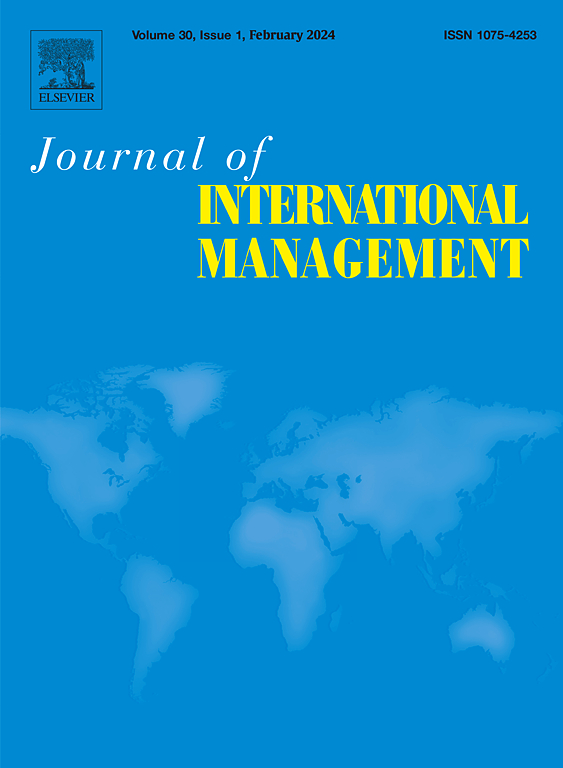两个臭皮匠胜过一个诸葛亮:欧洲跨国公司总部分散在本国的决定因素
IF 4.9
2区 管理学
Q1 MANAGEMENT
引用次数: 0
摘要
本研究考察了欧洲跨国公司(MNCs)国际活动的复杂性与其总部(HQ)系统在其本国地区的区域分散之间的关系。为了探讨这一点,我们评估了外部复杂性(与跨国公司在不同市场的暴露有关)和内部复杂性(跨国公司的价值链性质和开展的活动),并分析了它们对总部分散的影响。从理论上讲,我们借鉴了信息处理理论,该理论认识到高附加值的活动(例如,研发,营销)本质上更复杂的管理。因此,对这种复杂性的战略反应影响了总部系统的结构。我们的假设是用554个欧洲公司新投资的外国总部的样本来检验的。研究结果表明,复杂程度推动了总部系统的区域分散。从学术的角度出发,我们对跨国公司的复杂性进行了操作化分析,通过考虑跨国公司价值链和子公司活动的特点,着重分析了跨国公司的内部复杂性。此外,我们从经验的角度将区域层面的内部和外部复杂性与总部分散的战略反应联系起来。最后,我们的研究表明,随着价值链的区域化,总部可能会在地理上进行重组,这也是决策者感兴趣的一个话题。本文章由计算机程序翻译,如有差异,请以英文原文为准。
Two heads are better than one: Determinants of European MNC's headquarters dispersion in their home region
This study examines the relationship between the complexity of the international activities of European multinational corporations (MNCs) and the regional dispersion of their headquarters (HQ) systems within their home region. To explore this, we assess both external complexity (related to MNC’ exposure to different markets) and internal complexity (the nature of the value chain and activities carried out by the MNC) and analyze their effects on headquarters dispersion.
Theoretically, we draw on Information Processing Theory, which recognizes that higher value-added activities (e.g., R&D, marketing) are inherently more complex to manage. As a result, strategic responses to this complexity influence the structure of the headquarters system. Our hypotheses are tested using a sample of 554 new foreign HQ investments by European companies. The findings suggest that the level of complexity drives the regional dispersion of headquarters systems.
From an academic standpoint, we operationalize the complexity of multinational corporations, particularly focusing on internal complexity by considering the characteristics of the value chain and subsidiary activities. Additionally, we connect both internal and external complexity at the regional level to the strategic response of headquarters dispersion from an empirical perspective. Finally, our study suggests that following the regionalization of value chains, headquarters may be reorganized geographically, which is also a topic of interest for policymakers.
求助全文
通过发布文献求助,成功后即可免费获取论文全文。
去求助
来源期刊

Journal of International Management
MANAGEMENT-
自引率
9.80%
发文量
67
审稿时长
81 days
期刊介绍:
The Journal of International Management is devoted to advancing an understanding of issues in the management of global enterprises, global management theory, and practice; and providing theoretical and managerial implications useful for the further development of research. It is designed to serve an audience of academic researchers and educators, as well as business professionals, by publishing both theoretical and empirical research relating to international management and strategy issues. JIM publishes theoretical and empirical research addressing international business strategy, comparative and cross-cultural management, risk management, organizational behavior, and human resource management, among others.
 求助内容:
求助内容: 应助结果提醒方式:
应助结果提醒方式:


